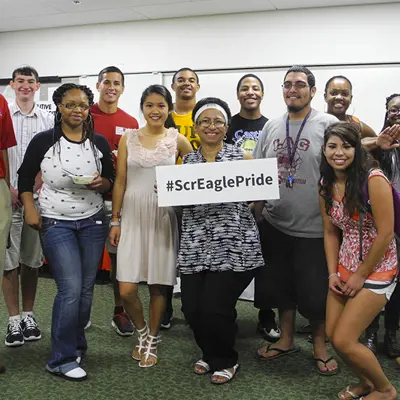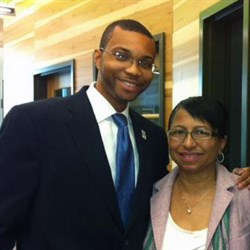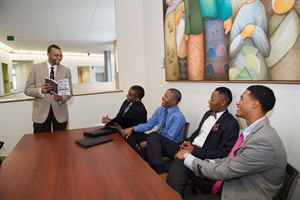
The birth and evolution of USI's Multicultural Center
October 20, 2014
It started as a seed, an idea to fill a need in an expanding university that was branching beyond a small corner of southern Indiana. The idea came from a bright, ambitious woman, Pam Hopson, working in USI's Student Financial Assistance Office, who was asked to spearhead a task force called the Minority Concern Task Force and, through her research and work came the birth of USI's Multicultural Center (MCC). "We did some studies, talked to students to see what they were looking for and researched peer institutions to see what they offered," said Hopson, director and founder of the Multicultural Center,
 Hopson was the sole staff member during those humble beginnings. Construction would change the home of the MCC several times before it found its permanent home in the lower level of the University Center East. Now settled, but continuing to develop and grow, the MCC will celebrate its 20th anniversary in September 2015.
Hopson was the sole staff member during those humble beginnings. Construction would change the home of the MCC several times before it found its permanent home in the lower level of the University Center East. Now settled, but continuing to develop and grow, the MCC will celebrate its 20th anniversary in September 2015.
The Center is known for bringing a variety of speakers, performing artists, and successful events and mentor programs to help a diverse population of students find personal and professional success. Two largely successful events include USI Live at the Apollo, an annual free student talent revue, (coming up on October 25) and the annual Martin Luther King Jr. Memorial Luncheon, an event which honors the memory of Dr. King and features famous inspirational speakers drawing hundreds from USI and the local community. Additionally, the MCC, in cooperation with the College of Liberal Arts, features its own gospel choir, Designed by Grace.
Both Hopson and Kacheyta McClellan, assistant director of the MCC, understand that the experiences and connections made at the University influence the success of its graduates. With that in mind, the MCC offers a multitude of personal and professional development opportunities, such as the Black and Brown Summit, a conference primarily geared toward African American and Hispanic students. In this conference, speakers from the community provide information on topics ranging from relationships to adjusting to college life.
Another program, Executive Diversity Scholars, provided in connection with Career Services and Internships, helps equip students for the job market. "We've told students it's important to have a network," said Hopson. "Our network is their network." Along with presentations, workshops and role playing scenarios, students have the opportunity to meet presidents, CEOs and hiring managers in the community.
 New this year is a mentor program led by McClellan called Priority One. The program recognizes the unique needs and hardships faced by young African American men. Dressed to the nines, in suits and ties, the students meet with McClellan on Fridays to set goals and agendas, build skills, and to hold one another accountable for achieving these goals. "They've been identified as individuals who want to be mentored and they want to be peer mentors," said McClellan. "They're working on presentation skills and talking about things that not only impact them, but also their peers and what can be done to help their peers be more successful."
New this year is a mentor program led by McClellan called Priority One. The program recognizes the unique needs and hardships faced by young African American men. Dressed to the nines, in suits and ties, the students meet with McClellan on Fridays to set goals and agendas, build skills, and to hold one another accountable for achieving these goals. "They've been identified as individuals who want to be mentored and they want to be peer mentors," said McClellan. "They're working on presentation skills and talking about things that not only impact them, but also their peers and what can be done to help their peers be more successful."
"You never know who you impact or how you touch lives until you get that phone call saying 'I just wanted to let you know I've been exceling in my job and I'm up for a promotion,'" said McClellan. "I've written letters of recommendation to graduate schools, medical schools and the police academy." Knowing his work is meaningful is what drives him. As far as what he hopes to see in the future for the MCC: "We want to be able to expand what we do; to wrap our services around more students and see more under-represented students being able to access us. We want to impact their experiences and develop them - through leadership skills and personal and interpersonal skills - so they want to come back to USI and contribute or remain connected in some way."
The atmosphere in the MCC is filled with the warmth and care that creates a family environment. The hours on the doors may read that the center closes at either 4:30 or 6 p.m., but Hopson and McClellan give students their phone numbers, just in case they're needed after hours. "Students know they can contact us anytime, and sometimes they just need someone to listen to them," said Hopson. "As much as we might say we're shutting down at 4:30 or 6, our hearts don't shut down at 4:30 or 6. They stay open."